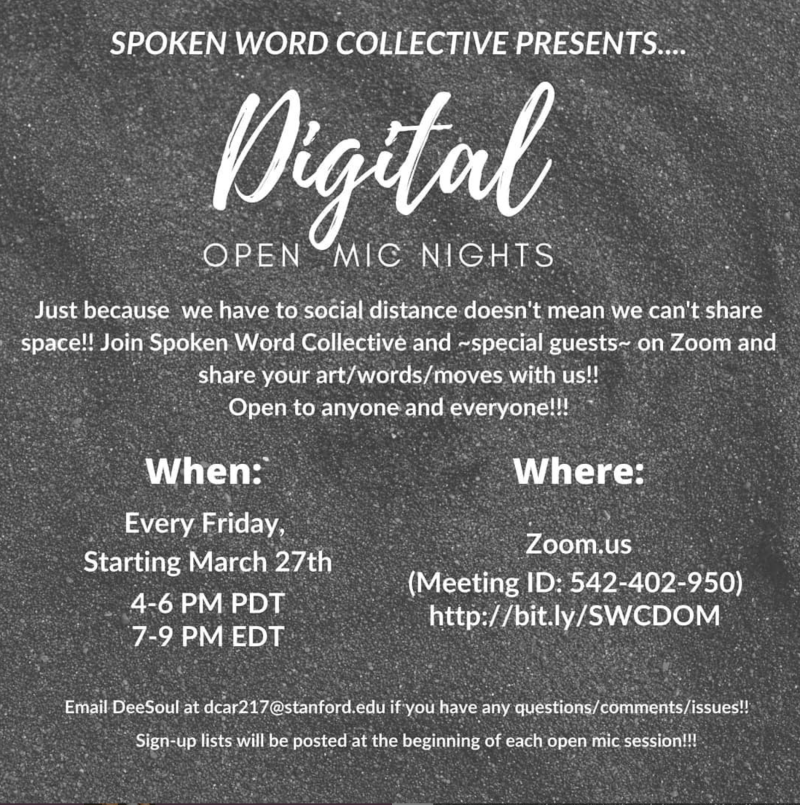For Darnell “DeeSoul” Carson ’21, the Spoken Word Collective means everything to him. As co-director of the collective, he began hosting open mics winter quarter at QSpot for artists and art lovers on campus to spend time together, sharing art and building community. Although there are no more on-campus events this school year due to COVID-19, Carson organized open mics to continue over Zoom.
Friday marked the first of 10 weekly digital open mics, with 47 people in attendance. More than 15 people performed, sharing poems and raps. Throughout the performances, attendees sent encouraging messages through the chat and react features on Zoom. Anyone with the link was invited to the call, including those not affiliated with Stanford. As each artist performed, Carson shared their Instagram handles so that attendees could follow and support their work after the open mic.
“I hope this is something that gets people through the week, because being away from people can be rough,” Carson said. “Just to know that at the end of the week, I’ll be able to take in some other people’s art and hear what they’re doing makes me feel really warm.”
For Matt Mettias ’23, Friday marked his first time performing at an open mic. He wrote his poem “Violation” in ITALIC 99: “Penning Poems We’re Proud Of,” a poetry course taught by Carson. He was inspired to try spoken word poetry after seeing his friends Michelle Ibarra ’23 and Hope Yoon ’23 perform at Spoken Word Collective’s quarterly shows.
“The moment they share a poem about a certain memory or seminal moment in their life, you realize there’s so much more that they’ve experienced in their lifetime,” Mettias said. “There’s so many more dimensions to them.”
Maya Salameh ’22 performed the first draft of her poem “A revision of the planets” or “Like the moon without her curlers in.” The poem is inspired by the Picatrix, a book of grimoire spells originally written in Arabic, with a large focus on cosmology. In her poem, Salameh brings a contemporary take, re-imagining the planets as roommates.
After Salameh performed, Carson held a copy of Salameh’s newly released chapbook “rooh,” encouraging attendees to check it out. In “rooh,” which means “soul” in Arabic, Salameh focuses on hyphenated identity and homeland. Salameh also focuses on “blood memory,” which she describes as “physical reminders of homeland; whatever your body remembers about geography.”
“I think the biggest thing that I learned from my poems and that I want people to learn from those poems is resilience,” Salameh said. “I write my poems always for Arab women first. We are not our trauma, and we are not our intergenerational trauma either.”
For Salameh, the Spoken Word Collective has been one of the most important creative communities on campus, she said.
“I love those poets,” Salameh said. “I love their writing, and being able to check in with them weekly with workshops and brunches, and I just feel so warm after the open mic.”
Alumna Juliana Chang ’19, former director of the Spoken Word Collective, performed two poems, “Bless your Soup” and “Chris and I go clubbing in Taiwan,” based on relationships, friendship and memories. She describes the collective as one of the “most important parts of Stanford” for her, helping her grow her craft as an artist but also giving her meaningful friendships.
“Most of my closest friends are from Spoken Word Collective, and I plan on staying friends with them for the rest of my life,” Chang said. “It’s a really good community and I’m so glad that it’s doing so well.”
For the following open mics, Carson has invited featured artists to perform as well, and is compensating for them out of his own pocket. He will also be inviting attendees to donate to artists if they can, as the COVID-19 pandemic has hit artists hard, causing them to lose out on their livelihood, Carson said.
Digital open mics are held Fridays from 4 to 6 p.m. PT. A line-up of featured artists can be found here.
“I put a lot of love into this,” Carson said. “Especially in the time where everyone is separated, we need more opportunities to get together and just enjoy each other’s company, even if we’re not in the same room.”
This article has been corrected to reflect that Darnell Carson taught ITALIC 99: “Penning Poems We’re Proud Of,” not ITALIC 99: “Immersion in the Arts.” The Daily regrets this error.
Contact Patricia Wei at patwei ‘at’ stanford.edu.
